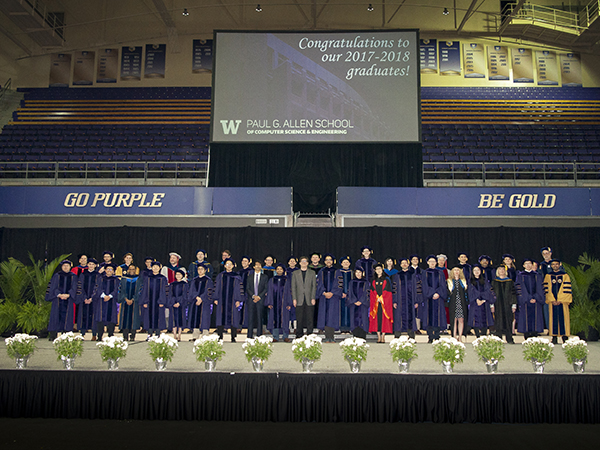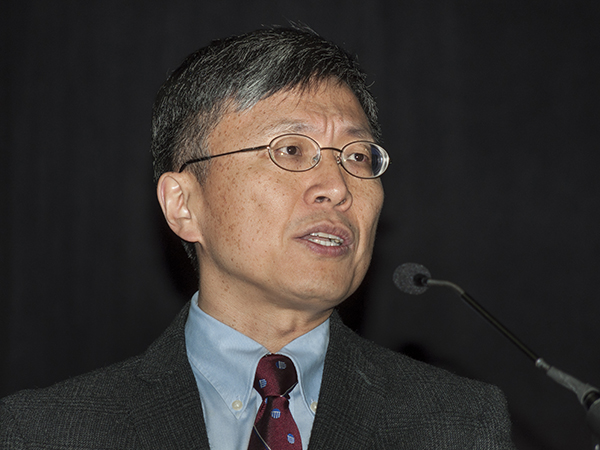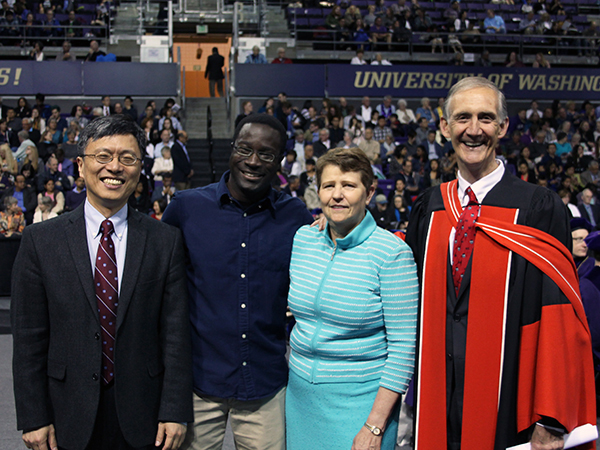
Newly-minted Allen School Ph.D.s with their faculty advisors. Karen Orders Photography
Tonight, the Allen School hosted its 2018 graduation event celebrating student, faculty, and alumni excellence. In addition to awarding nearly 450 degrees — a 20% increase over the previous year — and highlighting the contributions of Alumni Impact Award winners Yaw Anokwa and Eileen Bjorkman, we were honored to welcome graduation speaker Harry Shum, Executive Vice President of Microsoft’s Artificial Intelligence and Research Group and a longtime friend and supporter of the Allen School.
Shum set a celebratory tone for the evening as he congratulated students on their hard-earned degrees. “You, as CS graduates, have the opportunity to speed innovation and to transform our world for the better, perhaps more than any other profession.”
Suggesting that there has never been a more extraordinary time to work in computing, Shum drew inspiration from three areas of the field — quantum computing, artificial intelligence, and mixed reality — to offer the soon-to-be graduates advice for the future.
“As an adjunct CS professor myself, I thought about giving a technical talk today…” Shum joked, “But since you know about all of these areas already thanks to your great UW education, instead I thought I’d offer some life lessons.”
The biggest lesson, he said, is to embrace the uncertainty that comes with exploration and discovery. “Often reporters ask me, ‘What can a quantum computer do?’ My answer: ‘I don’t know,’” Shum explained. “You may wonder, ‘But Harry, how do you not know? You’ve been spending hundreds of millions’….Even the best minds of their time couldn’t predict the road ahead.”

Harry Shum: “I don’t think there’s ever been a more extraordinary time to be in the field of computing.” Karen Orders Photography
Shum’s second lesson reflected a commitment that he shares with the Allen School: diversity. While some people may worry about the impact of artificial intelligence on jobs or doomsday scenarios involving robots taking control, Shum is more concerned about AI bias. “We have to build AI systems that hear all voice and recognize all faces equally well across our diverse world to create the best future for everyone,” Shum said. The solution, he suggested, starts with people, not technology. Calling upon his firsthand experience with how diverse teams drive the best outcomes, Shum urged his audience to seek out opportunities to experience different cultures and perspectives. “Your thinking will be better as a result. You’ll build better products for everyone.”
Last but not least, Shum cited the tagline for one of his favorite products, the HoloLens, for his final piece of advice: “’When you change the way you see the world, you change the world you see.’ May you be inspired to see life differently, to pursue something new,” he said.
Two members of the Allen School community who are living examples of Shum’s advice are Alumni Impact Award recipients Yaw Anokwa and Eileen Bjorkman. Allen School professor Ed Lazowska presented the awards, which — in addition to acknowledging the extraordinary contributions of past students — demonstrate for our graduates that they are about to join a long line of individuals who have built upon their Allen School education to change the world. This year’s recipients each exemplify that principle in their own way: Anokwa through his work on the Open Data Kit for mobile data collection in the developing world, and Bjorkman through her distinguished career in the United States Air Force.
The Allen School also took the opportunity to highlight the students and faculty who have made lasting contributions of their own through research, teaching, and mentorship. This year, we had the opportunity to give the CRA-E Undergraduate Research Faculty Mentoring Award to professor Michael Ernst. Ernst was chosen by the Computing Research Association to receive the award based on his combination of research accomplishments and caring mentorship of aspiring computer scientists. Winners are recognized at the event of their choosing; it is fitting that Ernst, with his track record of offering rewarding research experiences to so many undergraduates — more than 120 at last count — that he would opt to celebrate with our students.
The opportunity to engage in high-quality research experiences is one of the hallmarks of an Allen School education for many undergraduates, and we recognize exceptional student research through our annual Best Senior Thesis Award. This year’s recipient, Bruno Castro-Karney, earned the award for his thesis, “A Crash-Safe Key-Value Store Using Chained Copy-on-Write B-trees,” completed under the guidance of professor Xi Wang.

Left to right: Harry Shum, Yaw Anokwa, Eileen Bjorkman, and Ed Lazowska. Kristin Osborne
For the second year in a row, the UW student chapter of the Association for Computing Machinery (ACM) awarded its Undergraduate Teaching Award to lecturer Adam Blank. As ACM officers Aishwarya Mandyam and Karishma Mandyam noted, Blank likely taught most of the students waiting to collect their diplomas. While Blank’s responsiveness is legendary — his average response time to questions posted on class discussion boards clocks in at around two minutes — his students also appreciate him for his dedication to learning for its own sake.
Many students themselves help to make the Allen School experience a rewarding one as teaching assistants (TAs). We honor a select group of outstanding TAs each year with our Bob Bandes Memorial Award to thank them for their efforts to inspire and encourage their fellow students — or, in the words of one student who nominated their TA, help to make challenging coursework “less painful than I thought it would be.” The 2018 winners were Aaron Johnston, Aaron Su, and Jefferson Van Wagenen, with Ollin Boer Bohan, Sarang Joshi, and Miya Natsuhara receiving honorable mentions.
We also honor a group of graduating students each year who demonstrate superior scholarship, leadership potential, and technical excellence with Outstanding Senior Awards. The 2018 recipients were computing engineering graduate Kathryn Howland, and computer science graduates Linxing “Preston” Jiang, Colin Summers, and Kaitlyn Zhou.
Last but not least, we select a graduating student each year who has actively and enthusiastically contributed to the Allen School community with our Undergraduate Service Award. This year’s honoree, Melissa Medsker (Galloway), is so passionate about computer science education that she served as a TA for 15 Allen School classes — earning a Bob Bandes Memorial Award of her own along the way.
View the video of the live-stream here and check out electronic copy of the printed graduation program here. See GeekWire coverage here.
Thank you to all of the friends, family, and alumni who came out to celebrate with us — and congratulations to the members of the Allen School’s Class of 2018! Please keep in touch!

